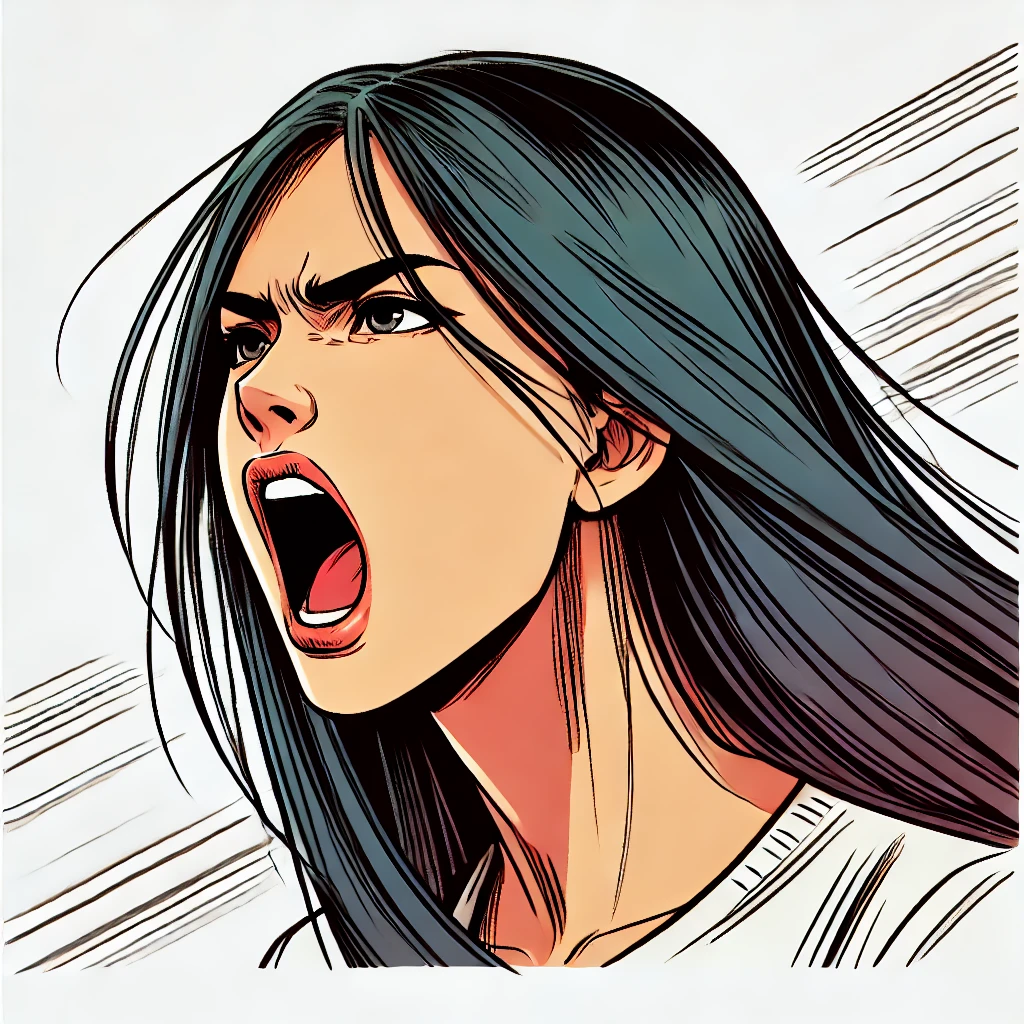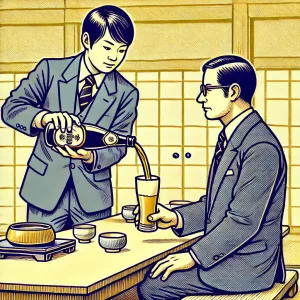うっせぇわ [Usseewa]
Ado [ado]
Words & Music : syudou [syudou]
“Usseewa” is a song released in 2020 as the first single by Ado. Its provocative lyrics and other aspects sparked a huge buzz, quickly spreading across social media. It seems the YouTube views have surpassed 300 million.
The songwriter and composer, who goes by the name “syudou,” is a “Vocalo-P.” In Japan, there’s a music culture where amateur musicians compose using voice synthesizer software and publish their works on video-sharing sites. “Vocalo-P” refers to those creators.
Now, let’s check out the provocative lyrics.
I’ll say this upfront: there are some misuses of words, so Japanese learners should avoid overinterpreting. There might also be some parts where you don’t understand what’s being said, but it’s best to just read on without worrying about it.
正しさとは 愚かさとは
tadashisa to wa orokasa to wa
それが何か見せつけてやる
sore ga nanika misetsukete yaru
- 正しい(ただしい) [tadashii] : correct
- 愚か(おろか) [oroka] : foolish
- 見せつける(みせつける) [misetsukeru] : show off
(translation) “What’s right, what’s foolish,
I’ll show you what it is.”
The phrase “やる / yaru” expresses a strong declaration of intent. It’s something villains in boys’ manga often say.
ちっちゃな頃から優等生
cchīna koro kara yūtōsei
気づいたら大人になっていた
kizuitara otona ni natteita
ナイフの様な思考回路
naifu no yōna shikō kairo
持ち合わせる訳もなく
mochi awaseru wake mo naku
- ちっちゃい(ちっちゃい) [cchī] : small
- 頃(ころ) [koro] : time, period
- 優等生(ゆうとうせい) [yūtōsei] : honor student
- 気づく(きづく) [kizuku] : realize
- 大人(おとな) [otona] : adult
- ナイフ(ないふ) [naifu] : knife
- 思考(しこう) [shikō] : thought
(translation) “Since I was a small honor student,
before I knew it, I had become an adult.
With no way to have a knife-like mindset.”
This line is a parody to lyrics from a song by the band Checkers, which was a hit in the early 1980s.
でも遊び足りない 何か足りない
demo asobi tarinai nanika tarinai
困っちまうこれは誰かのせい
komatchimau kore wa dareka no sei
あてもなくただ混乱するエイデイ
atemonaku tada konran suru eidei
- 遊ぶ(あそぶ) [asobu] : play
- 足りない(たりない) [tarinai] : not enough
- 困る(こまる) [komaru] : be troubled
- 混乱(こんらん) [konran] : confusion
(translation) “But I’m not satisfied with just playing, something is missing. This is someone’s fault. Wandering aimlessly, just a confused everyday.”
“Komatchimau” is a variation of “komatte shimau.” From here, casual Japanese becomes frequent.
“エイデイ / Eidei” is a coined word by the author and doesn’t have a clear meaning, but from the context, it might be “エブリデイ / everyday.” The author might have used controversial words intentionally to attract attention.
それもそっか
sore mo sokka
最新の流行は当然の把握
saishin no ryūkō wa tōzen no haaku
経済の動向も通勤時チェック
keizai no dōkō mo tsūkinji chekku
純情な精神で入社しワーク
junjō na seishin de nyūsha shi wāku
社会人じゃ当然のルールです
shakaijin ja tōzen no rūru desu
- 最新(さいしん) [saishin] : latest
- 流行(りゅうこう) [ryūkō] : trend
- 把握(はあく) [haaku] : grasp
- 経済(けいざい) [keizai] : economy
- 通勤(つうきん) [tsūkin] : commuting
- 精神(せいしん) [seishin] : spirit
- 社会人(しゃかいじん) [shakaijin] : working adult
- 当然(とうぜん) [tōzen] : natural
(translation) “Well, that’s just how it is.
Keeping up with the latest trends is a given.
Checking the economic trends on the commute,
starting work with a pure spirit.
It’s just a natural rule for working adults.”
The terms in this part are composed of two Kanji characters, making them sound formal.
The term “社会人 / shakaijin”(=society person) might be unique to Japan. While various things might have been forgiven during student days, once you start working, you’re expected to follow various rules, and it’s a common scene in any workplace. This part should be considered a quote rather than the speaker’s own words.

はぁ?うっせぇうっせぇうっせぇわ
haa? ussee ussee ussee wa
- うるさい(うるさい) [urusai] : noisy
(translation) “Huh? Shut up, shut up, shut up!”
This is a reaction to the sermon above.
“うるせえ / Urusee” is a casual and rough expression of “うるさい / urusai.” It’s a rude expression, so it shouldn’t be used outside of friends. “うっせえ / Ussee” is an even rougher version, with the ending particle “わ / wa,” which originated from the Kansai region wiki and adds a lively tone. The resulting special slang “うっせえわ / usseewa” is extremely crude and aggressive, and it’s even more shocking that a woman says (sings) it.

あなたが思うより健康です
anata ga omou yori kenkō desu
一切合切凡庸な
issai gassai bonyō na
あなたじゃ分からないかもね
anata ja wakaranai kamo ne
- あなた(あなた) [anata] : you
- 思う(おもう) [omou] : think
- 健康(けんこう) [kenkō] : health
- 凡庸(ぼんよう) [bonyō] : mediocre
(translation) “I’m healthier than you think.
Everything’s pretty mediocre,
you might not understand.”
嗚呼よく似合う
aa yoku niau
その可もなく不可もないメロディー
sono kamo naku fuka mo nai merodī
うっせぇうっせぇうっせぇわ
ussee ussee ussee wa
頭の出来が違うので問題はナシ
atama no deki ga chigau no de mondai wa nashi
- 似合う(にあう) [niau] : suit
- メロディ(めろでぃ) [merodī] : melody
- 問題ない(もんだいない) [mondai nai] : no problem
(translation) “Ah, it suits you well,
that neither good nor bad melody.
Shut up, shut up, shut up.
There’s no problem because we’re on different levels.”
“嗚呼 / aa” is a filler word. The kanji used here carries no particular meaning.
つっても私模範人間
tsuttemo watashi mohan ningen
殴ったりするのはノーセンキュー
naguttari suru no wa nō senkyū
だったら言葉の銃口を
datta ra kotoba no jūkō o
その頭に突きつけて撃てば
sono atama ni tsukitsukete uteba
- 模範的(もはんてき) [mohan-teki] : exemplary
- 人間(にんげん) [ningen] : human
- 殴る(なぐる) [naguru] : hit
- 言葉(ことば) [kotoba] : words
(translation) “Even so, I’m an exemplary person.
No thank you to hitting.
So why not point the muzzle of words
at their head and shoot?”
マジヤバない?止まれやしない
maji yaba nai? tomare ya shinai
不平不満垂れて成れの果て
fuhei fuman tarete nare no hate
サディスティックに変貌する精神
sadisutikku ni henbō suru seishin
- マジ(まじ) [maji] : seriously
- やばい(やばい) [yabai] : risky, incredible
(translation) “Isn’t it seriously dangerous? It won’t stop.
The culmination of complaints and dissatisfaction,
a sadistically transforming spirit.”
“やばい / Yabai” originally means risky, but recently it has become a slang word used in a positive sense. Here, perhaps “incredible” might be a good translation.
Omitting “ku” in “Yabakunai” is a Kansai slang. Kansai dialect is becoming accepted among young people as a standard language due to the influence of Kansai-originated comedy.
クソだりぃな
kuso darii na
- クソ(くそ) [kuso] : crap, very
- だるい(だるい) [darui] : sluggish
(translation) “It’s freaking tiring.”
“クソ / Kuso” originally means excrement, but it’s also used to describe something bad, similar to “sucks” in English. And here, it means “very.” While it’s a harsh word, it’s quite commonly used daily. It’s not as forbidden as words that would get censored on American TV. And Japanese vulgar language is generally mild, and there aren’t many words that are more offensive than this.
“だるい / Darui” originally means physically tired, but in youth slang, it often means unmotivated.
酒が空いたグラスあれば直ぐに注ぎなさい
sake ga aita gurasu areba sugu ni sosoginasai
皆がつまみ易いように串外しなさい
mina ga tsumami yasui yō ni kushi hazushinasai
会計や注文は先陣を切る
kaikei ya chūmon wa senjin o kiru
不文律最低限のマナーです
fubunritsu saiteigen no manā desu
(translation) “If the glass is empty, pour it immediately.
Remove the skewers so everyone can easily pick at them.
Take the lead on bills and orders.
These are the minimum unwritten manners.”
This starts a section of quotes again, describing the unwritten rules at company dinners.
It’s a fact that such strange manners are often enforced in Japan’s old-fashioned communities. Just as foreign people may not understand them, these are also hard for the younger generation to understand and accept.

はぁ?うっせぇうっせぇうっせぇわ
haa? ussee ussee ussee wa
くせぇ口塞げや限界です
kusee kuchi fusage ya genkai desu
絶対絶対現代の代弁者は私やろがい
zettai zettai gendai no daibensha wa watashi yarogai
- 臭い(くさい) [kusai] : smelly
- 口(くち) [kuchi] : mouth
- 限界(げんかい) [genkai] : limit
- 絶対(ぜったい) [zettai] : absolutely
- 現代(げんだい) [gendai] : modern times
- 私(わたし) [watashi] : I
(translation) “Huh? Shut up, shut up, shut up.
Shut your stinking mouth; I’ve had enough.
Absolutely, absolutely, the spokesperson for modern times is me, you know.”
“やろがい / Yarogai” is an emphatic ending. It’s Kansai slang, probably popularized nationwide by Kansai comedy’s “tsukkomi” (correcting role) lines. It’s quite a rough word and can sound like yakuza wiki language, which is rather scary if it’s not used in comedy. Strong language fits well with Kansai dialect.
もう見飽きたわ
mō miakita wa
二番煎じ言い換えのパロディ
niban senji iikae no parodi
うっせぇうっせぇうっせぇわ
ussee ussee ussee wa
丸々と肉付いたその顔面にバツ
maru maru to niku tsuita sono ganmen ni batsu
- 見飽きる(みあきる) [miakiru] : get tired of seeing
- 丸(まる) [maru] : circle
- バツ(ばつ) [batsu] : cross
(translation) “I’m tired of seeing it.
A parody of second-rate imitations.
Shut up, shut up, shut up.
A cross on that plump face.”
In Japanese tests, a correct answer is marked with a big circle, while a wrong answer is marked with a large cross.
うっせぇうっせぇうっせぇわ
ussee ussee ussee wa
うっせぇうっせぇうっせぇわ
ussee ussee ussee wa
私が俗に言う天才です
watashi ga zoku ni iu tensai desu
- 天才(てんさい) [tensai] : genius
(translation) “Shut up, shut up, shut up.
Shut up, shut up, shut up.
I’m what’s commonly called a genius.”
うっせぇうっせぇうっせぇわ
ussee ussee ussee wa
あなたが思うより健康です
anata ga omou yori kenkō desu
一切合切凡庸な
issai gassai bonyō na
あなたじゃ分からないかもね
anata ja wakaranai kamo ne
嗚呼つまらねぇ
aa tsumaranē
何回聞かせるんだそのメモリー
nankai kikaseru n da sono memorī
うっせぇうっせぇうっせぇわ
ussee ussee ussee wa
アタシも大概だけど
atashi mo taigai da kedo
どうだっていいぜ問題はナシ
dōdatte ii ze mondai wa nashi
(translation) “Shut up, shut up, shut up.
I’m healthier than you think.
Everything’s pretty mediocre; you might not understand.
Ah, it’s boring. How many times are you going to make me listen to that memory?
Shut up, shut up, shut up.
I’m quite something too,
but I don’t care; there’s no problem.”
To be honest, I must say the intended humor or social criticism by the author is rather cliché. My impression is that the childishness, including the misuse of words, stands out.
However, I think it’s fine for everyone to enjoy the slang and vulgar words in the lyrics. The strong impact of the lyrics “Ussee” and the skilled vocalist’s performance have created a song that grabs a lot of attention. Of course, using crude language carries risks, so for those who want to try it out, you should train well first.
The singer Ado is not the author of these lyrics, and her personality should be considered separate from the content of the lyrics. She’s probably not such a coarse woman. Ado was 17 years old when this song was released and shows incredible vocal skills. It makes you want to listen to her in other songs and roles.
Thanks for reading! Feel free to comment if you have any feedback or questions.
Follow me on X.



